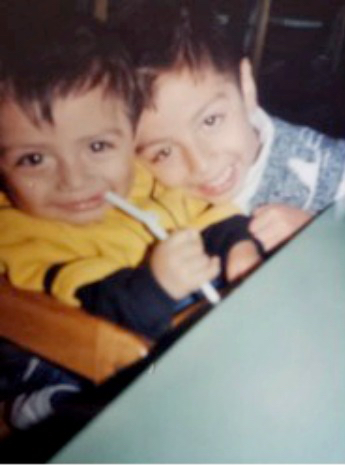“Get your brother out before he is six feet underground.”
I went back home a few weeks ago. My first night back home I heard two gunshots. BANG! BANG! I woke up; I knew I was running out of time.
Every morning, I juggle the thought of losing my younger brother to the gang violence in Chicago. I rehearse my reaction. There are days when I feel that I will be strong enough to move forward. But, there are days when I feel like my heart will be too heavy for me to move forward.
“You’re not going to be anything.”
Accusations like these were ones I always directed at my younger brother. I was frustrated, stressed, angry, and disappointed that he was falling under bad influences. I judged and judged. Yet, I never bothered to ask why things were the way they were. I never stopped and wondered why my brother resorted to bad influences. I always felt that I set the example for him– that was enough. Yet, never bothered to notice the, “Why can’t you be like your brother?” statements or the microaggressions that teachers always directed at him.
“You’re a disappointment.”
I alienated him. I told him that if I could do it, then so can he. He would always say, “We are two different people.” He was right; we were different. My teachers always motivated me, I went to a college preparatory school, and I had mentors that pushed me along. My brother did not have any of these things. He never had a teacher that believed in him. He only had teachers that would complain about his unwillingness to participate, to be engaged, or anything they found troubling with him. At times, teachers would pull me out of class to simply reprimand my brother. Little did I know I was further contributing to the structure that will soon derail him.
“I just don’t understand why?!”
Once I got to college, I finally understood how wrong I was. I always believed this ideology of one picking themselves up by the bootstraps. It was an ideology I used to justify my own success and one I used to judge those that fell behind. I finally understood that the way things work is in a way in which youth like me face many barriers that hinder them from being able to get a higher education. While I was fortunate enough to always find a loophole through each barrier, my younger brother wasn’t. He fell behind and instead of me picking him up, I kept pushing him lower. My brother wasn’t incompetent. He was a victim of the surveillance of teachers, school administration, and people including myself that saw my brother to always be “at-risk”. He was “at-risk” of not doing well in school, of disrupting the class, and of raising havoc. His way of resisting was to do the opposite of what these authoritative figures wanted him to do. Had he had one person that believed him and pushed him forward, then maybe he would be in a much better position than the one he is in today.
“I’m sorry.”
I have tried to restore my relationship with my younger brother. There are times when he asks me about school and of all the places I have traveled. I tell him of all the wonderful things I have experienced to only then feel guilty that he may never be able to experience these things. I know that this is not completely my fault but the thought of me being able to save him always crosses my mind. He deserves more—kids like him deserve more. My brother has so much potential. His passion for the arts is something I have come to appreciate. His drawing skills and his love for music is truly what makes him stand out. So, although my brother and I are in two very different places, he shines brighter than ever. And maybe others can’t see that, but I do. I see it– I just hope he sees it too.
Guillermo Camarillo
Latest posts by Guillermo Camarillo (see all)
- Ser un Estudiante Universitario y Quererte a Ti Mismo - August 23, 2017
- Being a College Student and Loving Yourself - August 9, 2017
- Plan de Emanuel “No Hay Plan, No Hay Diploma” No Habra Graduados de Preparatoria Listos Para Una Carrera Universitaria - August 8, 2017
- Emanuel’s “No Plan, No Diploma” Won’t Produce College and Career Ready HS Graduates - August 1, 2017
- Un Estudiante Universitario Pobre, Buscando Más - April 13, 2017


Pingback: Those We Demonize and Condemn – Center Point